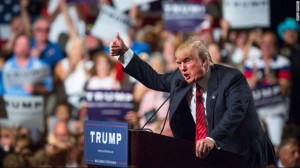Ezra Klein has hit on a matter that ought to send chills up the spines of even the most ardent of Donald J. Trump’s supporters.
Writing on Vox.com, the bright young journalist/researcher writes about something Trump said this past Sunday on “Meet the Press.”
Trump said the guy who rushed the stage in Dayton, Ohio, where he was speaking was a follower of the Islamic State. How did he know that? He saw something on the Internet, Trump said, which meant it just had to be true.
Is Trump too gullible to be president? That’s the question Klein seeks to answer. He seems to believe Trump’s gullibility disqualifies him categorically for the presidency.
As if he hasn’t disqualified himself already with all the countless earlier idiotic pronouncements he’s made.
The Internet is a valuable source for information. It’s also a source for nonsense.
For more years than I care to remember — perhaps ever since the Internet came on the scene — I’ve adhered to a certain policy: It is to believe the tiniest fraction of 1 percent of anything I read on the Internet. You cannot take seemingly anything at face value if you read it “on the Internet.”
I actually have spoken with people who submitted letters and essays to the newspaper where I worked with information that looked patently absurd, but who swore to me that it was true “because I saw it on the Internet.”
Trump’s assertion on national television Sunday morning that the stage rusher was an ISIS supporter based on Internet chatter demonstrates way beyond the shadow of any doubt of Trump’s unfitness for the office he is seeking.
The guy who rushed the stage? He’s an Italian-American named Thomas DiMassimo, a Christian … who denied immediately any ISIS allegiance. He said he was was just trying to make a scene.
Mission accomplished, dude.
